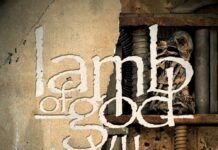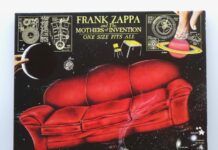Fresh on the scene with their landmark self-titled debut in April 1980, newcomers IRON MAIDEN were already ready and willing to make sure the world would know their name. Their sophomore release, “Killers,” was released less than a year later on February 2nd, 1981, via EMI, and is also noteworth for being their final release with original vocalist Paul Di’Anno before he was fired and replaced with Bruce Dickinson prior to the release of “The Number of the Beast” in 1982. Today, on its 40th anniversary, we take a look back at this legendary band’s sophomore album.
In the history of IRON MAIDEN‘s lengthy discography, “Killers” is noteworthy for having two instrumental tracks, as well as for being nearly completely written by bassist Steve Harris. It was also one of the few albums that still featured the late Clive Burr on drums (who passed away from multiple sclerosis in 2013). Some editions of the album, such as the American release, also include a track co-written by guitarist Dave Murray, entitled “Twilight Zone,” which was not part of the original album.
The album opens with the first of the instrumental tracks and one of the few “intro” tracks that IRON MAIDEN has done, “Ides of March.” This song is driven by furious drumming by Burr, as well as some great guitar riffing that would become known as part of MAIDEN‘s signature sound. Noteworthy, this song is very similar to SAMSON‘s “Thunderburst,” and while is occasionally miscredited to Steve Harris alone, it is more accurately credited to Harris and the members of SAMSON. This intro flows fairly seamlessly into the live-favorite “Wrathchild,” which is driven by a truly funky and fabulous bass line, the type that lets you know that Harris was/is a true force with which to be reckoned. The song seems to speak about a person hunting down their deadbeat father, or at least that has always been my impression. The ferocity of this song, coupled with its relatively short time, makes for a very punchy piece.
The album then slows down for “Murders in the Rue Morgue,” which shows that IRON MAIDEN didn’t need speed to have incredible guitar chops. The vocals by Di’Anno are fun and strong, though admittedly not on the same level as what Dickinson would later offer. “Another Life” is likewise most notable for its absolutely sick guitar shredding. The somewhat echoey effect on Di’Anno‘s voice is interesting, a quality that is present in most of the songs to some degree. “Genghis Khan” is the second instrumental, which is both funky and pure heavy metal at the same time, with truly fantastic drumming and riffing throughout by everyone involved. “Innocent Exile” is another funky, fun track that bounces around a bit, with a lot of sharp drum stops and some really interesting bass lines.
The title track is certainly one of the most well-known and still relatively well-played tracks from the band’s early years, which also features some of Di’Anno‘s most stylish singing. The galloping rhythm for which MAIDEN is very well known is also strongly present in this piece. “Prodigal Son” slows things down again, not quite to ballad territory, with a more strumming feel to the guitar but still a lot of very creative bass. Di’Anno‘s smoother and softer vocals are really enjoyable, creating another angle to the band’s sound, keeping things very diverse. The song is, however, admittedly a bit long on the whole.
The album then finishes up with another fairly well-known track, “Purgatory,” and then “Drifter.” The former is another speedy, riff-driven piece that’s pretty catchy with a fun chorus that’s easy to sing along to. The latter shows off some of Di’Anno‘s wails and has an almost rockabilly style to it.
Ultimately, coming off “Iron Maiden” in 1980, “Killers” breaks through the sophomore slump and shows that IRON MAIDEN had a lot of ideas and a lot to offer still. A mere year later, they would return once again and start on a new and even stronger path with Bruce Dickinson on lead vocals, but Di’Anno‘s time in the band still holds a special legacy. Despite not having much of the band’s best material, this album still proves to be worth a re-listen from time to time, to remember where MAIDEN comes from and what they were like in the early days.
Tracklist
- The Ides of March (instrumental)
- Wrathchild
- Murders in the Rue Morgue
- Another Life
- Genghis Khan (instrumental)
- Innocent Exile
- Killers
- Prodigal Son
- Purgatory
- Drifter
Lineup
- Paul Di’Anno – vocals
- Dave Murray – guitars
- Adrian Smith – guitars
- Steve Harris – bass
- Clive Burr – drums
Label
EMI
Links
Recent posts
[recent_post_carousel design=”design-1″]





